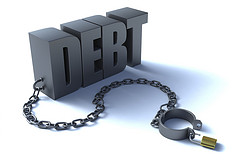Debt Settlement is an option to clear old debts and improve your credit score.
When you find yourself faced with a very stressful financial situation, there are only a few options:
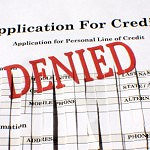
Consolidation Loan
Debt Management
Debt Settlement
CONSOLIDATION LOAN
A consolidation loan may be:
- Second Mortgage on your home or other property
- Personal loan with your bank or credit union
- Balance transfer from a credit card offer
Getting a second Mortgage or even what's called an "Equity Line of Credit" through your bank or another lending institution, may be possible with lower than normal credit scores.
Just be very careful and do your homework and math to make sure that the lender is not charging you such a high rate of interest or fees that this type of loan makes no sense in the long run!!!
But, a Consolidation Loan will not really change your credit scores right away! Here's why:
The calculations to determine a credit score in fairly complicated, but one of the most important or "weighted" portions of that calculation is the ration of current debt to the total available debt you have.
For example:
Let's say you have 5 credit cards with a total available credit of $20,000.
You have maxed-out 4 of the 5 for a total of $15,000 of debt.
You "Debt Ratio" looks like this...
$15,000 divided by $20,000 equals a 75% debt/available debt ratio
That's high as far as the Credit Bureaus evaluate your "credit worthiness" with a credit score!
For more information, check out:
How Are Credit Scores Determined?
So, even if you do qualify for a Consolidation Loan, your credit score may not improve quickly!
DEBT MANAGEMENT
Debt Management is what we used to be referred to as Credit Counseling a few years ago.
In a Debt Management Program, each of your creditors agrees to lower you interest rate and may forgive or bring current late fees, etc. Each creditor is a little different.
But, consider this:
- Your total monthly payments on all of your debts may not be less!
- But, being enrolled in a program like Debt Management, will not quickly improve or change your credit scores!
- If you miss a scheduled payment, you may void the agreement and you are right back where you started.
Before you enroll in one of these programs, you might consider and even do much better by looking into a DEBT ACCELERATOR PROGRAM.
DEBT SETTLEMENT
If you qualify, a Debt Settlement Program may give you all of the results you are looking for:
- ONE Lower Monthly Payment
- Total Balances of you debt reduced by 50% or more!
- Debt Free in about 3-5 years, depending on your particular circumstance
- Ultimately Improve your Credit Score!
A Debt Settlement Program is for someone who is going through a very tough time, especially in the financial area!
- Loss of employment or cut in pay
- Divorce or other family upheaval
- Death of a spouse or loved one
- Limited income after retirement
- Disabled or suffering from severe illness
Most of your accounts are either delinquent or about to become severely "behind".
You've probably had one or more of your accounts turned over to a Debt Collector and are enduring the constant phone calls and letters.
By the way....you can put a stop to those calls now:
Rather than continuing to make minimum monthly payments on your accounts, you will be making a monthly payment that FITS YOUR BUDGET into a FDIC insured bank account.
As these funds are growing, negotiations with your creditors and debt collectors begin to arrange a SETTLEMENT AGREEMENT.
But, will Debt Settlement Improve your credit score?
Yes, but over time!
It may be hard to understand, but a potential lender is looking for a couple of key items in a credit report, such as:
- How much credit are you carrying now?
- Length of employment?
- Credit History...not just late payments, but how long and how have you handled your credit payments over time?
- What is your "credit worthiness"...If a loan is granted, what is the likelihood that you can and will repay as agreed?
Just because you have fiancial trouble now or in the past IS NOT an automatic DECLINE OF CREDIT!
When you have had all of your accounts settled with a ZERO BALANCE, you will be offered NEW CREDIT as your Credit Scores will have improved.





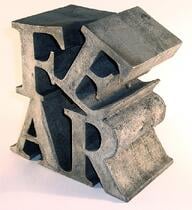

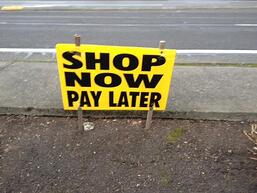 Sadly, when faced with the annoying and often
Sadly, when faced with the annoying and often 

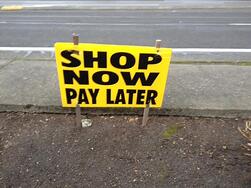
 In a bankruptcy, you will eliminate most of your debt or you will be able to schedule a repayment plan that will fit your budget, given your dire financial circumstances.
In a bankruptcy, you will eliminate most of your debt or you will be able to schedule a repayment plan that will fit your budget, given your dire financial circumstances.
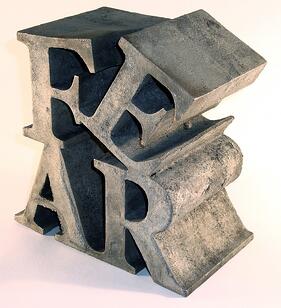
 HOW WOULD YOU FEEL IF YOU WERE DEBT FREE ? ? ?
HOW WOULD YOU FEEL IF YOU WERE DEBT FREE ? ? ?